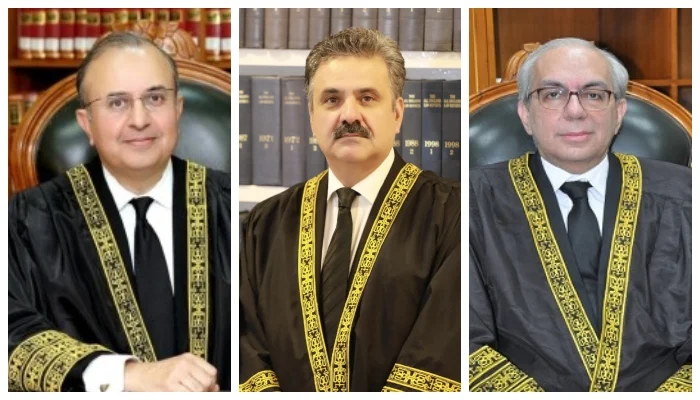Two senior members of the Supreme Judicial Council (SJC), Justice Mansoor Ali Shah and Justice Muneeb Akhtar, have raised serious objections to the recent amendments made to the judges’ code of conduct, calling into question both the procedure and implications of the move. The amendments were approved by a majority in the council, but the two judges have urged that the process be halted until key constitutional matters are settled.
In a detailed letter to the SJC, Justice Mansoor Ali Shah and Justice Muneeb Akhtar criticised the manner in which the amendments were approved and expressed concern over the participation of Islamabad High Court Chief Justice Sarfraz Dogar, whose transfer to the IHC is currently under challenge before the Supreme Court.
The controversy emerged after the SJC meeting on October 18, chaired by Chief Justice of Pakistan and SJC Chairman Justice Yahya Afridi, which introduced new restrictions in the code of conduct for judges. The revised code prohibits judges from interacting with the media or engaging in public debates on political matters. The meeting was attended in person by Justice Aalia Neelum, Chief Justice Lahore High Court, and Justice Sarfraz Dogar, while Justices Shah and Akhtar joined via video link.
According to the amended code, “[Judges] shall not have any interaction with the media, especially in relation to issues which may give rise to public debate or adversely affect institutional collegiality and discipline,” stated the official notification.
In their joint letter, the two Supreme Court judges warned that such changes could undermine judicial independence, limit transparency, and concentrate authority in a single office — particularly during a period when the judiciary is already under pressure following the 26th Constitutional Amendment.
The letter highlighted, “We are passing through testing times, when democracy itself faces strain and constitutional institutions are being tested. In such moments, a strong, fearless, and independent judiciary is the last refuge of the people. Any measure that curtails that independence or can be weaponised to discipline, silence, or control judges must be viewed with the utmost caution and resisted firmly.”
The judges recommended postponing the implementation of the new amendments until the Supreme Court decides on the petitions challenging both the 26th Constitutional Amendment and the position of the current SJC chairman. They further wrote, “Experience has shown that when the institution itself is under strain, such concentration of authority makes the system more fragile, not stronger. Judicial independence cannot rest on the perceived virtue or courage of one person; it must be distributed, not centralised.”
The letter underscores a widening divide within the judiciary over institutional reforms, as some members advocate for stricter discipline while others warn that over-centralisation could erode judicial autonomy — a concern that continues to dominate Pakistan’s legal and constitutional landscape.

